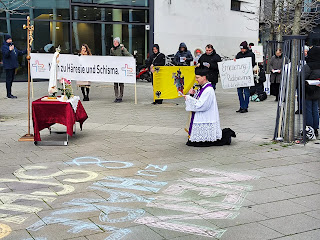Synodal Path just the beginning of the demands
The chairman of the German Bishops' Conference, Georg Bätzing, drew a positive balance of the synodal path reform process. "A great weight fell from my heart," said Bätzing on Saturday at the end of the fifth and final synodal assembly on the reform of the Catholic Church in Frankfurt am Main.
"The Synodal Path worked - despite all the crunch and despite all the prophecies of doom," said the Limburg bishop. "We haven't been able to decide everything yet, but the course has been set. Overall, we passed the stress test." You can see that the Catholic Church is capable of change. It is abstruse to regard the synodal path as the beginning of a split or path to a German national church.
How German church reformers mess with Rome
The President of the Central Committee of German Catholics (ZdK), Irme Stetter-Karp, was much more critical. The discussion process led to a new culture of discussion within the church. It is a great success that all topics are now openly on the table.
"Passed the stress test"
But Stetter-Karp also vented her disappointment: "Without a doubt, I would have wished for more. We have not managed to really change the structure of the Catholic Church in Germany. Three and a half years were not enough." Therefore, in the next three years, a Synodal Committee will prepare a Synodal Council in which clergy and lay people will continue to make decisions together in the future.
Synodal assembly authorizes blessing celebrations for homosexual couples
On Friday, the synodal assembly decided to officially celebrate blessings for homosexual couples. 176 voted in favor of 202 assembly members, 14 voted against. Twelve abstained. The necessary two-thirds majority of the bishops was also achieved. The celebrations are to be introduced "promptly" in the German dioceses.
The approval of blessing ceremonies for same-sex couples was a main requirement for the Synodal Path reform process, which has been ongoing since 2019, and was considered a touchstone for the Catholic Church’s ability to change in Germany. A working group is now to be formed to create a handout for the blessing celebrations. This should specify how the celebrations should take place. As soon as the handout is ready, each Bishop can implement the blessing celebrations in his diocese. In 2026 there will then be an evaluation of the experiences.
Blessing celebrations have so far been a gray area in canonical law
The blessing celebrations are already practiced in many communities today, but they take place in a gray area in terms of canon law. It was precisely this gray area that many of the synod members criticized. It was time to get blessing celebrations out of living rooms and secret meetings in a church, it was said several times. In future, the priests who give the blessing should no longer have to fear sanctions. Divorced people who have remarried should also be able to be blessed.
Antwerp Bishop Johan Bonny reported at the Synodal Assembly on the introduction of blessing ceremonies for same-sex couples in Belgium, which has already taken place. This was relatively silent, said Bonny. They have agreed informally with the Vatican and Pope Francis. The Pope only said to him: "That is your decision." It was important to him that all bishops were behind it.
In front of the event building, at the end of the synodal assembly, critics protested for whom the reforms discussed went too far. Under the motto »No to heresy and schism« a small group of protesters demanded that Georg Bätzing resign from the office of chairman of the German Bishops' Conference. A priest wearing a biretta, a headgear that is no longer common among Catholic clergy, prayed in front of a statue of Mary while banners called for a turning away from renewal processes.
Protest outside











.jpeg)

Comments